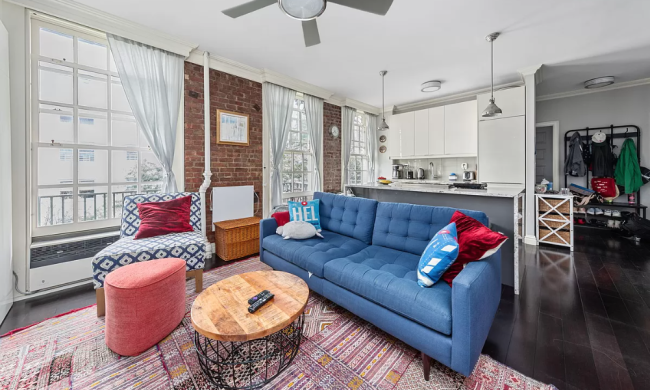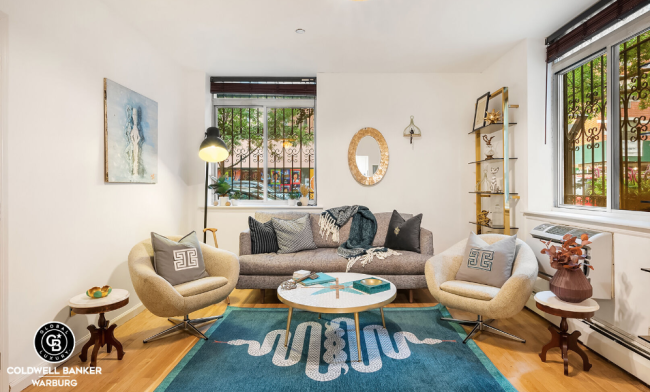Considering a ground-floor apartment? Here's what you need to know
- These units are typically cheaper and may have private outdoor space or a separate entrance
- You need to beware of noise, pests, and safety issues when buying a ground-level apartment
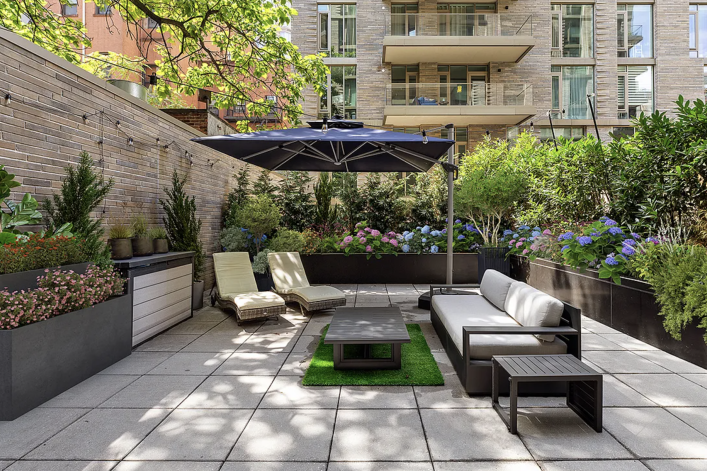
Private outdoor space is a big perk for many ground-floor units. A one-bedroom condo with a 800-square-foot landscaped terrace in Hell's Kitchen is asking $1.445 million.
It’s not just the fact that you can skip the stairs: Ground-floor apartments have many advantages over apartments on higher floors in New York City. But there are some disadvantages buyers need to be aware of as well.
On the plus side, these apartments are sometimes less expensive than units on higher floors and make more sense for New Yorkers with babies in strollers, dogs, or mobility issues. They also offer more privacy—you don’t need to share an elevator with your neighbors— and a backyard or deck provides an opportunity to expand your living space.
Still, the drawbacks can be deal-breakers for some: Ground-floor apartments can be more likely to have problems with insects and rodents. Depending on the location and configuration of your apartment, you may have to worry about passersby peering in. Street noise is also an issue.
In this Buy Curious, Ryan Kaplan, a broker at Corcoran Group, and Bryan Kreider, an agent at Sotheby's International Realty, tell you everything you wanted to know about life on a building’s ground floor.
[Editor's note: An earlier version of this post was previously published in November 2023 We are presenting it with updated information for November 2024.]
The question:
I’ve heard a ground-floor apartment might be my best bet in terms of value. What do I need to know?
The reality:
It’s true that you can sometimes save money when buying a ground-floor unit, but that's not always the case—it varies widely by neighborhood, building, and layout.
Still, a ground-floor apartment can offer buyers, especially in high-end buildings, a big discount.
And at least some of these apartments can be as desirable as living on the top level. "The location, streetscape, and environment around a building have as much to do with the quality of life in that unit as the building's own operational systems," Kaplan says. Is it on a block that's crawling with tourists or club-goers? Proceed with caution.
But if it's on an entirely residential side street with no restaurants or bars to speak of, Kaplan says it can be a European-like experience.
On a more practical level, "the accessibility is a key feature for someone who may be less mobile, or needs to come and go more frequently," Kreider says.
Here's what to consider when exploring street-level living in NYC.
How well-kept is the building?
Building maintenance will be even more important to you in a ground-floor apartment. Your place could be the first stop for rodents and creepy crawlies that make their way into your building.
Be sure to ask a few questions about how frequently the super takes out the trash and recycling. And find out if the building is taking preventative measures against bugs and mice.
In a well-maintained building, however, pests should not pose a problem—whether it's a full-service condo or a smaller co-op.
"I sold a ground-floor duplex with a basement in a boutique co-op in the West Village that was extremely well-run and clean," Kaplan says. So, the scale of the building is not determinative. "A small building could keep the garbage in the basement and take it directly out to the sidewalk, so it wouldn't matter that you were on the ground floor," he says.
However if you're flanked by restaurants or bars, then the volume of foot traffic and trash on the street has a much greater impact and could end up attracting more vermin, he says, as could your own adjacent neighbors (and that's true on any floor).
Do your research and pay careful attention when visiting the apartments, both inside and out.
Looking to buy a co-op apartment? National Cooperative Bank offers competitive rates and easy pre-qualification. With 40 years of lending to buyers in New York City, NCB is the bank for co-ops. After all, Cooperative is our middle name! Call us at (202) 349-7455 or email Ryan Greer [email protected] #507534. Equal Housing Lender.
Will heat be a problem?
Another thing to consider is how you’ll stay warm when the weather turns cold.
Heat rises, so if the building has not been well insulated, keeping warm can become a task.
Kaplan has never heard of any complaints about heat. "These days, we have the technology to build skinny towers that are 1,100 feet in the air, so we have the ability to heat ground-floor units. It's about the caliber of the building."
Should you be worried about people looking in the windows?
You'll definitely need to watch out for looky-loos if you are in a street-facing unit. (Even nosy neighbors may try and sneak a peek.)
If you're in a parlor-floor unit, you're actually raised a bit from the street, so it's better than if you are on the same grade as the sidewalk, Kaplan says.
He and Kreider point to a number of solutions to help deter wandering eyes. Kreider suggests installing frosted or smart-glass windows or planting trees or shrubs in front of the windows. "Curtains or blinds are a must unless you have an extravagant need for attention," he adds.
Kaplan recommends using reverse shades that start from the bottom and obscure the lower part of the window while leaving the upper portion open so light can stream in.
He says one of his clients tinted her windows, which makes it hard to see inside from the street but allows you to see outside from within. "There are multiple options," he says, reiterating the ultimate goal of avoiding living on a busy block.
In some cases, a good trade-off is to buy a unit at the back of the building. What you might sacrifice in natural light can be worth the privacy and quiet—and you might score a backyard.
Will you need to be more concerned about break-ins?
Safety can be an issue with ground-floor units. They're the easiest access point—and since some ground-level apartments may be out of the eye line of passersby, thieves gain some cover.
If you are on the ground floor of a building with 24/7 security or doorman service, this shouldn't be of concern.
What's more, Kaplan says metal grates are often on the street-level windows of buildings with ground-floor apartments. "They range from less-attractive jail-cell bars to more architectural wrought-iron ones in historic districts."
You can also look into installing a smart security system for added peace of mind, which is what owners of brownstones typically do to protect their ground-floor entrance.
| What to know about buying a ground--floor apartment in NYC | |
|---|---|
| Pros |
|
| Cons |
|
| Price |
|
Will people ring your bell doorbell more often?
Probably. In smaller buildings (especially walk-ups), the ground-floor or basement-level apartments are often home to the super, so it’s possible that delivery people and new tenants might ring your bell under the assumption that you’re there to let them in or help them in case of emergency.
This can be mitigated by clearly labeling your buzzer and mailbox.
Will a ground-floor unit be noisier?
Generally speaking, sure. You are closer to the action than a higher floor unit.
How much so depends on where your apartment is located within the building. Are you close to the entrance? If so, you may hear the building’s front door open and close each time someone enters or exits. If it's close to the elevator, you may hear it ding every time it opens—and be privy to people’s conversations as they wait around for it to arrive. Of course, this is more of a concern in a building where the ground-floor unit opens into the lobby, rather than the street.
Street noise can be a very real concern. Kaplan reiterates the need to evaluate the street scene by asking, "Is there something that will attract young people and other partyers?" If so, take a pass.
Units toward the back of the building will be quieter—and, depending on the layout, you may be less likely to hear neighbors opening and shutting the lobby door.
"For anyone with an aversion to street noise, I recommend looking into soundproofed windows from companies like CitiQuiet or Cityproof," Kreider says. (Read Brick's guide to soundproofing windows for more information.)
As for upstairs-neighbor noise, "If you're on the seventh floor of a 20-story building, you're still going to have upstairs neighbors, and how much that matters depends on the quality of the building," Kaplan says. "Prewar buildings tend to be built with better sound attenuation than, say, post-war buildings where the walls might be thinner."
Should you be worried about flooding?
Unfortunately, storms in recent years have caused major flooding in ground-level homes across the boroughs, as well as in amenity spaces that are often put sub-level where apartments aren't zoned to occupy.
Many new construction condo buildings now have plans to mitigate potential flooding, but not all developers put enough thought into worst-case scenarios during the building process. If you’re buying a property that is partially under grade, you should inquire as to whether there’s a plan in place for torrential downpours.
Here’s the city’s flood hazard map if you want to check if the area you are considering a ground-level apartment is at high or low risk.
Are the prices actually lower?
The short answer is: Yes, but...multiple factors are at play (as with all things real estate).
According to Kreider, who looked at closed Manhattan sales market data from UrbanDigs over a six-month period, ground-floor apartments tend to sell at a median listing discount of around 4.5 percent from initial asking price. However, he added that "the median listing discount can change significantly with seasonality and the overall market environment."
So, while ground-floor units have conventionally offered a 5 to 20 percent discount from a comparable non-ground-floor unit in the same building, he adds that it also depends on factors like whether the building has an elevator or is a walk-up. "You also have to keep in mind the condition of the unit, ceiling heights, and the existence of outdoor space, as well as views, light, and layout—all of which can make it difficult to compare apples-to-apples."
He points to a case study involving two one-bedroom units that were recently on the market at 137 East 28th St.: #1A was a ground-floor unit that had just been gut renovated and a smaller layout but an extra foot of ceiling height that sold for $495,000. In comparison, #5A had been updated but not as recently and sold for $575,000. "Even though these two listings are in the same building, they are two wildly different products, which makes it complicated to compare," he says.
Kaplan says basement-level spaces sell for one-half to one-third of the price per square foot of upper-floor units.
What's more, if the space is below ground and exceeds a certain ratio, that square footage will not be assigned taxes or pro rata common charges. (Speak to your real estate attorney to find out the details.) "That's a very interesting nuance for owning square footage for less than operational costs," Kaplan says.
Besides price, are there any other pros?
Definitely. Plenty of New Yorkers eschew larger buildings with doormen and elevators but find themselves no longer willing or able to bound up three flights of stairs, whether due to mobility issues or because of strollers. Dog owners also appreciate the convenience of popping in and out.
Outdoor space is another huge potential perk. Not every ground-floor unit will have any, of course, but many will. Kaplan (who was a developer before switching to sales) says another nuance of ground-floor living with a backyard is that there might be unused air rights. "As a broker, I have used that same logic to work with buyers who buy some of those air rights from the co-op or condo board and then expand the backward unit into the yard, assuming you follow setback requirements." He says this is more common in historic districts because no one is able to knock down existing buildings and rebuild.
And at least when it comes to the lower level of a multi-family brownstone, you are often getting the most desirable spaces. "As the place where visitors were received, the parlor floor has the highest ceilings and the most original character," Kaplan says.
What’s the deal with maisonettes?
If the ground-level unit you’re looking at has been dubbed a “maisonette,” it will come with a heftier price tag. Such units typically have their own private street entrances (affording you more peace and privacy than most ground-floor units) and multiple floors.
"It's almost like a townhouse carved out of a larger building," Kaplan says. He has worked with clients who only want a maisonette—they want the private outdoor space, they don't want to walk up steps, but they can't afford a full $10 to $15 million townhouse. In other words, "They want the best part of townhouse living without the cost," he says. One client was also open to getting a ground-floor unit with the possible option of buying the upstairs apartment to create a maisonette.
You’re most likely to find these residences in older buildings in neighborhoods like the Upper East Side, Upper West Side, Washington Heights, West Village, and Brownstone Brooklyn.
Do ground-floor units sound like a fit? Check out these five apartments on the market.

505 West 43rd St., #1C, Hell's Kitchen
Located on the ground floor of a 16-story, 123-unit building, this one-bedroom, one-and-a-half-bath condo features nine-foot ceilings, floor-to-ceiling windows with electric shades, light oak floors, and central AC. The open kitchen has high-end appliances, including a dishwasher and wine refrigerator, and access to a south-facing, 807-square-foot landscaped terrace. Amenities at 505 West 43rd St., which dates to 2019, include an indoor pool and connected outdoor sun deck, a fitness center, double-height lobby library and lounge, rooftop with grilling station, and children’s playroom. The apartment is listed at $1.445 million with $1,675 monthly common charges and $1,650 monthly taxes.

735 Bergen St., #1B, Prospect Heights
This 1,100-square-foot duplex condo is on the market for $1.295 million, with $1,095 in monthly common charges and $1,024 monthly taxes. It has herringbone floors, multi-zone AC and heat, double-paned windows, an open kitchen with stainless steel appliances, custom cabinetry, and a breakfast bar, a living/dining space, a bedroom with large picture windows overlooking the garden, and a full bathroom with a deep soaking tub and marble tile. The flexible lower level, which has a half bath, custom built-in shelving, and a washer/dryer, can function as a bedroom suite or a home office/artist studio (or a combination) and exits onto a 20-by-20-foot garden with an ipe wood deck. Bergen Modern dates to 2014 and has eight units on five stories.
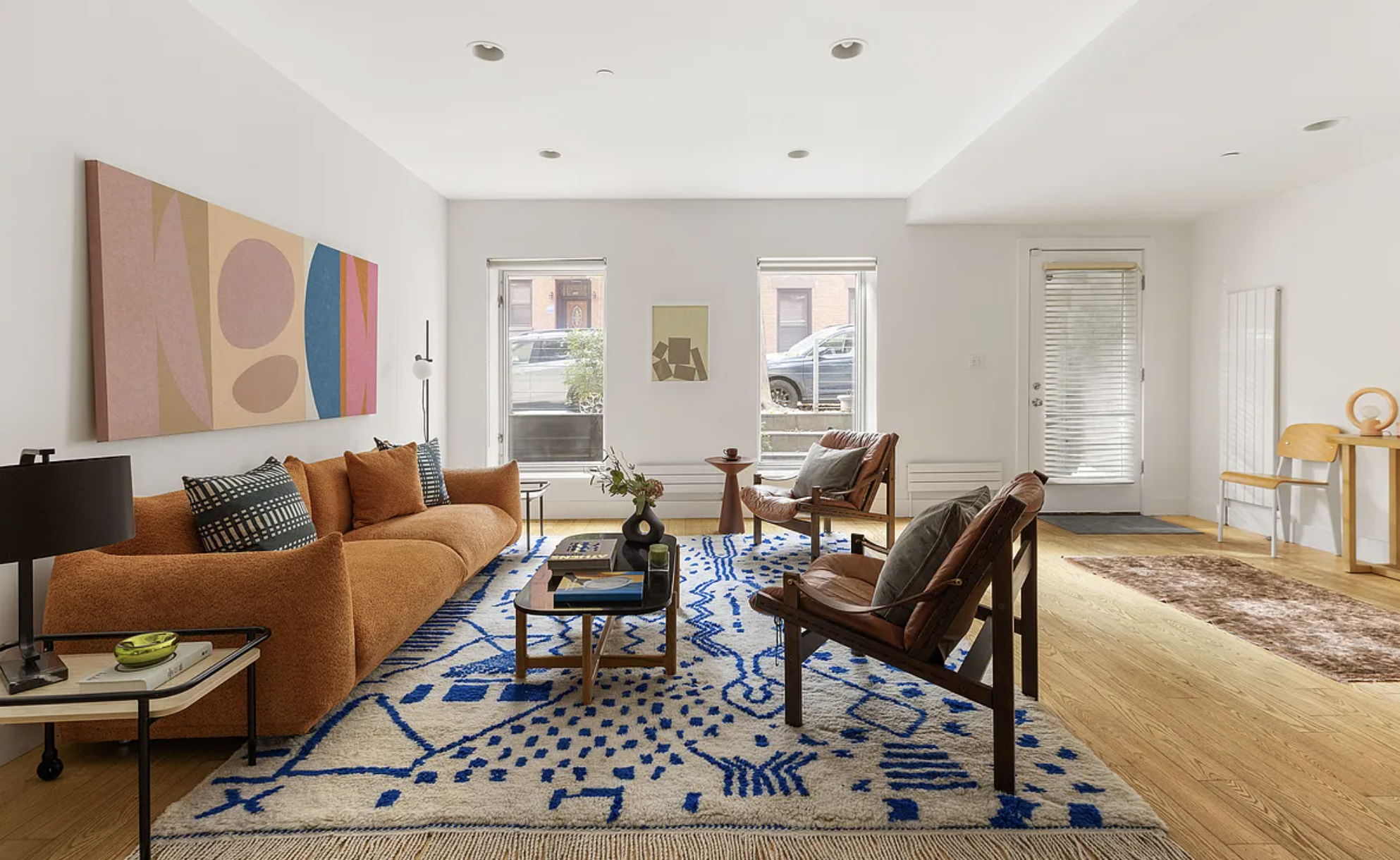
321 Union St., #1B, Carroll Gardens
Listed at $1.999 million, this 1,663-square-foot two-bedroom duplex with two baths is entered through a private, gated vestibule into the open living-dining space on the street side. The kitchen features stainless steel appliances, including a dishwasher, and tall cabinetry for extra storage. The primary bedroom has a windowed en suite bath and two windows looking out onto the 25-foot-wide, south-facing backyard with a raised patio. Located in a 1920 building, the boutique condo has seven units on four stories. Monthly common charges are $921 and monthly taxes are $467.
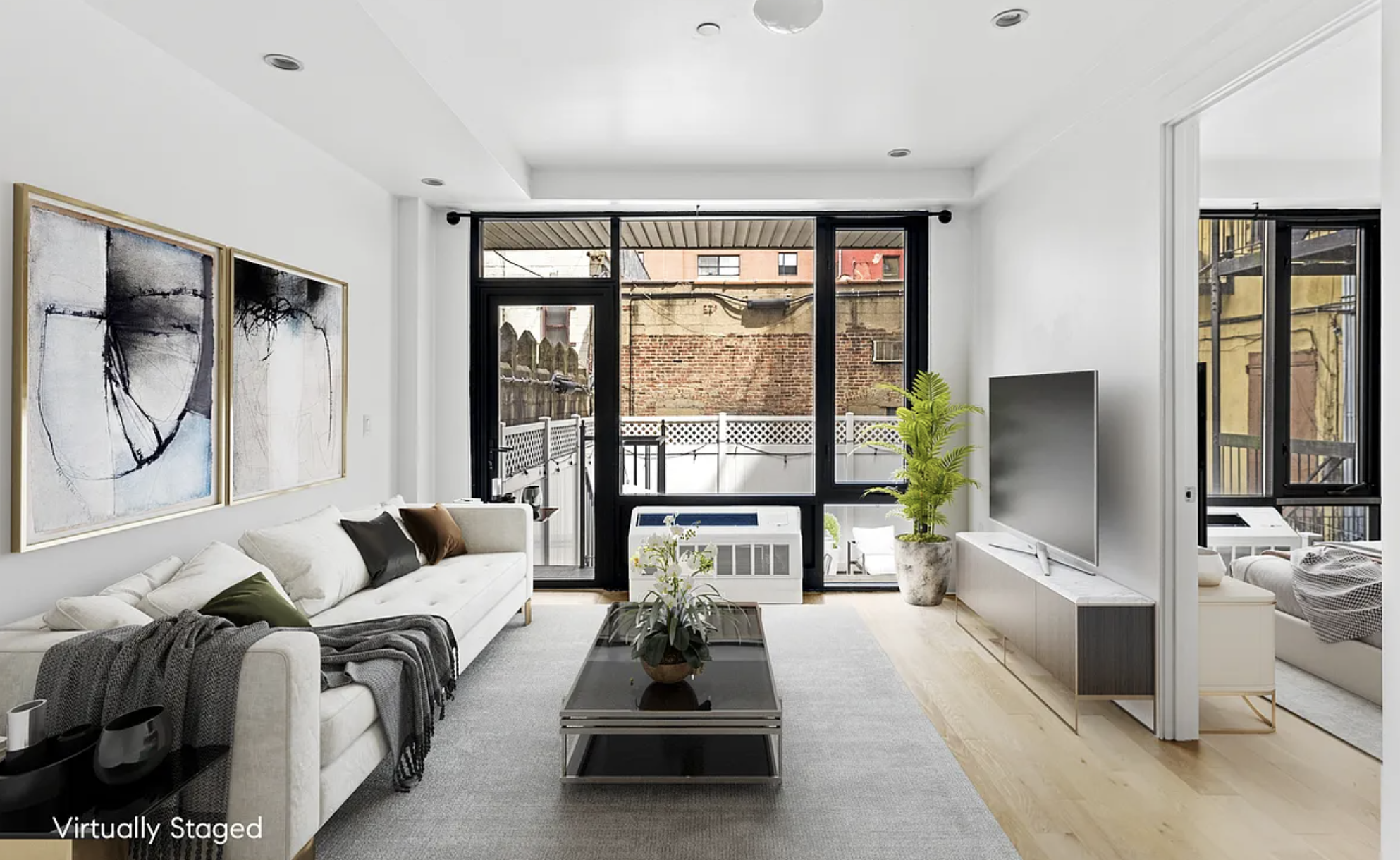
399 East 8th St., #1A, East Village
This newly renovated 750-square-foot condo, listed at $1.25 million, has two queen-sized bedrooms, a modern kitchen with a dishwasher, a washer/dryer, hardwood floors, and south-facing, floor-to-ceiling windows, plus direct access to a private garden and storage space below. Monthly common charges are $673; monthly taxes are $62. Dating to 2016, the nine-story, 133-unit building offers a virtual doorman, furnished rooftop deck, state-of-the-art gym, billiards lounge, pet spa, package storage, and bike storage.

180 East End Ave., #1A/D, Yorkville
This 3,300-square-foot co-op was created by combining adjacent units and is located steps up in the 21-story, 150-unit co-op. It is on the market for $3.3 million; monthly maintenance is $7,658. The flexible layout includes four bedrooms, one used as a den/library with built-in cabinetry, a wall of closets, and an ensuite bath, as well as an enclosed loggia/family room with windowed seating with garden views. The eat-in chef's kitchen features high-end appliances and an enclosed washer/dryer. Other features include high ceilings, herringbone oak floors, soffit lighting, and custom cabinetry and closet space. Built in 1960, Gracie Towers offers 24-hour doormen, concierge and live-in resident manager services, a heated rooftop swimming pool, fitness center, library/lounge, children’s playroom, bike room, and landscaped garden.
—Earlier versions of this article contained reporting and writing by Leah Hochbaum Rosner.
You Might Also Like
The Agency's Off-Market Advantage
Discover off-market properties in your dream neighborhood that perfectly suit your needs and budget. Meet and deal with sellers before their apartment hits the market.


Let The Agency's off-market team give you exclusive access to apartments in your price range and desired neighborhood that no one else has seen. More options, less competition, no bidding wars.




















